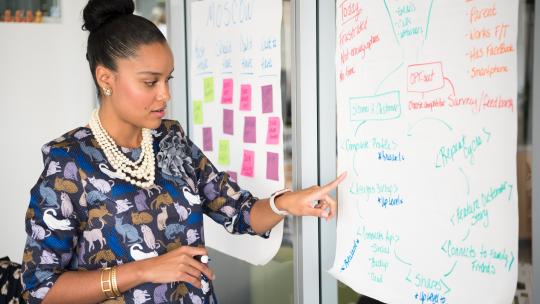Green economy
The green economy encompasses a growing, dynamic and broad range of organisations across multiple industries, including:
-
Recycling and air pollution,
-
Renewable energies,
-
Green spaces such as urban greening,
-
Green travel,
-
Low carbon industries such as alternative fuels and carbon finance.
As the sector evolves, many organisations outside of these industries find themselves with interests aligned to the green economy, and so the sector continues to grow.
Despite its significant growth, there is a pressing lack of diversity in the ‘green skills’ workforce. Green employment is rapidly increasing in industries with ongoing challenges in diversity, including construction, finance and energy.
The 2021 ECITB Workforce Census identified that women represent just 14% of the Engineering and Construction Industry (ECI) workforce, Asian individuals account for just 2%, and Black individuals represent just 0.6%. This represents significant underrepresentation of some groups relative to their population in London.
According to a 2021 report by the Green Jobs Taskforce, “Across the UK, there are already over 410,000 jobs in low carbon businesses and their supply chains, with turnover estimated at £42.6 billion in 2019.” This industry growth is certainly a positive sign for the UK’s Net Zero strategy. There is, however, a need for greater diversity in order to further innovation in the green sector.
In a rapidly evolving economy, innovation is key. As indicated across a breadth of research, diversity of thought and experience is integral to leading-edge organisational and sector development. This 2013 report from Deloitte sets out the importance of diversity in innovation, citing an “83% uplift” therein when workers feel that EDI is being prioritised. The same report details that a 31% increase was also seen in “responsiveness to changing customer needs” when EDI was felt to be embedded. This toolkit helpfully sets out actions, which will embed EDI toward these imperative outcomes across the green economy.
In order to target these actions, it is helpful to know which areas will require particular focus. A 2022 report published by Students Organising for Sustainability found that only 4.81% of ‘environment professionals’ identify as Black, Asian or Minority Ethnic (BAME), significantly below the national average of 12.64% for all UK professions.
The report also details primary research carried out to understand the perspectives of students. Out of all students surveyed, 44% of BAME respondents said they are discouraged by the lack of diversity in the sector. The Involving Young People Collective - in partnership with Esmée Fairbairn Foundation and Hudl Youth Development Agency - found that there is a lack of accessibility for those from lower socio-economic backgrounds. This was particularly noticeable when looking at entry routes into the sector; gaining the relevant work experience to break into the industry can often require young people to give up their time to volunteer or pursue below-minimum wage opportunities.
A parliamentary publication looking into diversity, inclusion and access to green jobs stressed the importance of more career advice to raise awareness of jobs and entry-routes into the sector, as well as the benefits of direct outreach to diverse communities.
With green jobs growing at 8% a year - a figure that is double the rate of the tech sector - the green sector is well-positioned to embed diversity and inclusion in our pursuit of a thriving and sustainable future.
How to use this toolkit
Step 1
Click on the toolkit below which corresponds with your organisation size.
Step 2
Begin by reviewing the overview of actions recommended for your organisation size. You can then explore more detail, case studies and further resources on these actions through each of the five areas of the toolkit.
Step 3
Create a checklist of the actions your organisation will focus on in the next 30, 60, 90 days. Prioritise actions labelled “foundational” where you have not yet implemented them. Use the information on about each action to create a plan tailored to your organisation.
Use this toolkit if you are a small business with fewer than 10 employees.
This toolkit is for small organisations with 10-99 employees
Use this toolkit if you are a medium-sized business with 100-249 employees
This toolkit is tailored to large organisations with over 250 employees
Explore research, reports and resources on EDI in the Green economy.




